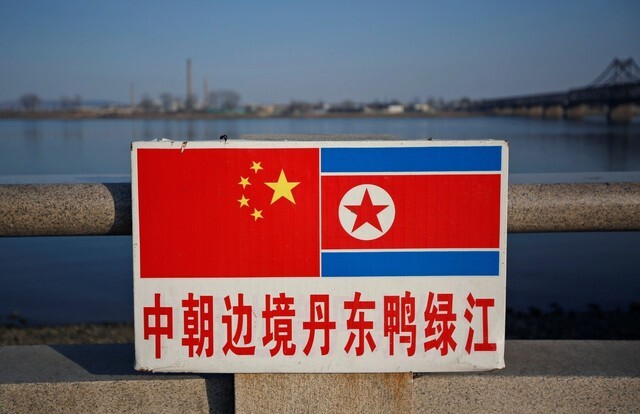hankyoreh
Links to other country sites 다른 나라 사이트 링크
North Korean restaurants in China likely to be forced out of business

The Chinese government’s notice that North Korean companies in China must shut down will likely lead to the closing of all the North Korean restaurants in the country. The notice, which was issued by China’s Ministry of Commerce and the State Administration for Industry and Commerce on Sept. 28, orders all foreign-invested companies, partnerships and joint ventures established in China by North Korea companies or individuals to close by the beginning of January 2018.
While the scale of North Korean investment in China is not large, China’s repeated signals that it is imposing tough sanctions on the North have emerged as a variable in their bilateral relations. Figures released last year by the Korea International Trade Association (KITA) indicate that North Korea’s investment in China is at a virtual standstill. Though its investment over the decade from 2006 to 2015 amounted to US$22 million, yearly investment fell from US$11.2 million in 2010 to US$290,000 in 2014 and then to US$70,000 in 2015. This is quite a difference from South Korea’s investment in China last year, which added up to US$3.3 billion.
Such investment as North Korea has made in China is largely focused in the restaurant industry, which is expected to take a direct hit. KITA figures show that North Koreans are running over a hundred restaurants in China – including 26 in Beijing and more than 10 in Shanghai – in a variety of formats, such as partnerships, joint ventures and foreign-invested companies. The notice means that all these restaurants will have to close, but since they aren’t an important source of funds for the regime of North Korean leader Kim Jong-un, their closure will only have a limited impact, experts say.
While UN Security Council Resolution No. 2375 bans joint ventures with North Korean companies and individuals, it’s striking that China has gone beyond that to also ban foreign-investment companies that were merely established with North Korean capital. Since this can be effectively regarded as unilateral sanctions by China, some analysts see this as a message warning North Korea not to commit additional provocations.
During the Chinese Foreign Ministry’s regular press briefing on Sept. 29, Ministry Spokesperson Lu Kang said that the notice in question was designed to implement the UN Security Council resolution and cautioned against reading too much into it, adding that China is consistently opposed to unilateral sanctions that go beyond the UN Security Council’s framework. But there are indications that China is taking independent measures against North Korea, such as media reports that Chinese banks recently ended transactions with the North.
Some analysts are focusing on the fact that China released the notice prior to US President Donald Trump’s visit to China and the US-China summit in November.
“China seems to be taking preliminary and precautionary measures because it has concluded that the US might resort to a secondary boycott. China is trying to take preemptive measures to reduce the pressure from the US,” said Lee Hui-ok, director of the Sungkyun Institute of China Studies.
Kim Heung-gyu, director of Ajou University’s Chinese Policy Research Institute, has a different view: “Since China is a great power now, we can conclude that it is trying to play a more active and leading role on the North Korean nuclear issue and on Korean Peninsula issues than during the presidency of Hu Jintao.”
By Kim Oi-hyun, Beijing correspondent and Kim Ji-eun, staff reporter
Please direct questions or comments to [english@hani.co.kr]

Editorial・opinion
![[Guest essay] Preventing Korean Peninsula from becoming front line of new cold war [Guest essay] Preventing Korean Peninsula from becoming front line of new cold war](https://flexible.img.hani.co.kr/flexible/normal/500/300/imgdb/original/2024/0507/7217150679227807.jpg) [Guest essay] Preventing Korean Peninsula from becoming front line of new cold war
[Guest essay] Preventing Korean Peninsula from becoming front line of new cold war![[Column] The state is back — but is it in business? [Column] The state is back — but is it in business?](https://flexible.img.hani.co.kr/flexible/normal/500/300/imgdb/original/2024/0506/8217149564092725.jpg) [Column] The state is back — but is it in business?
[Column] The state is back — but is it in business?- [Column] Life on our Trisolaris
- [Editorial] Penalties for airing allegations against Korea’s first lady endanger free press
- [Editorial] Yoon must halt procurement of SM-3 interceptor missiles
- [Guest essay] Maybe Korea’s rapid population decline is an opportunity, not a crisis
- [Column] Can Yoon steer diplomacy with Russia, China back on track?
- [Column] Season 2 of special prosecutor probe may be coming to Korea soon
- [Column] Park Geun-hye déjà vu in Yoon Suk-yeol
- [Editorial] New weight of N. Korea’s nuclear threats makes dialogue all the more urgent
Most viewed articles
- 1Behind-the-times gender change regulations leave trans Koreans in the lurch
- 2South Korean ambassador attends Putin’s inauguration as US and others boycott
- 3Family that exposed military cover-up of loved one’s death reflect on Marine’s death
- 4Yoon’s broken-compass diplomacy is steering Korea into serving US, Japanese interests
- 5[Guest essay] Preventing Korean Peninsula from becoming front line of new cold war
- 6Marines who survived flood that killed colleague urge president to OK special counsel probe
- 7Japan says its directives were aimed at increasing Line’s security, not pushing Naver buyout
- 8Yoon’s revival of civil affairs senior secretary criticized as shield against judicial scrutiny
- 9Amid US-China clash, Korea must remember its failures in the 19th century, advises scholar
- 10Lee Jung-jae of “Squid Game” named on A100 list of most influential Asian Pacific leaders